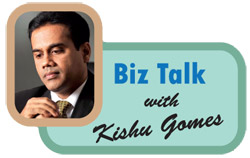 Managing time and life Managing time and life
Our life is about goals. Rarely does a person live without an
ultimate aim or a dream fluttering somewhere over the horizon. But
reaching this goal implies performing thousands of petty tasks, everyday
chores, meetings and actions.
Planning the activities effectively is what time management is about.
Actually, time management is not the correct word since we cannot manage
or control time but can only manage ourselves, our actions to fit into
the time limitation. That is why I prefer the term 'life management'.
Basically the idea of life management is to organise your daily life
so that you could more easily and quickly reach your ultimate goals.
However, only a bunch of disciplined minds will not lose heart dealing
with complex time organisers, schedules and heaps of paper.
The majority of people consider it as an attribute of corporate life,
although it is boring and time-consuming to implement as a daily
routine. The most powerful time is when you are alone, thinking about
what you are to do rather than doing it. You ought to set aside time
each evening to plan and take control over the most precious resource at
your command, the next 24 hours. Done correctly, daily planning is not
an expense that will cost you time but an investment that will pay you
back many times over the time invested.
Seven areas
Create a 'To Do' list of everything you 'have to' do and everything
you 'want to' do the next day. If you want to manage it, you have to
measure it first. Add action steps to take care of your commitments and
responsibilities but also include other action items to help you to
balance your life more effectively and achieve more of your goals in
each of your seven vital areas: health, family, financial, intellectual,
social, professional and spiritual.
Review every item in your 'To Do' list and ask yourself three
questions with regard to each item:
'Is this the best use of my time?' If it is, make plans to implement
it. If it isn't, try to figure out a way to delegate it. 'Is there a
better or more efficient way of handling or completing this item?'. 'Is
there anything I can do in advance to prepare for this task?'
Review any appointments and scheduled events you have planned for the
next day and ask yourself the same three questions. As you review each
commitment, determine if it is the best use of your time.
Maybe you are due to attend a meeting that has little value to you.
Try to get excused. See if there is a better way to handle each
commitment. For example, instead of actually meeting someone, can't you
fax, email or call that person instead? Can you do anything to be better
prepared for it? If you have a supplier's appointment, are there
questions you can write down to ask the supplier?
Whatever the improvements, add them to your 'To Do' list as action
items.Prioritise your 'To Do' list. Place number '1' next to the most
important item on your list. Place '2' next to the second most important
item. Continue prioritising the entire list.
You now have a 'To Do' list of all the items you 'have to' do, but,
more importantly, all the items you 'want to' do, including action items
to help you achieve your goals and better life balance and make your
appointments and scheduled events and 'To Do' list items flow smoothly.
Daily planning will save you time in the long run and increase your
daily productivity.
Many time management experts advice the introduction of a system
based on a carrot-and-stick principle. Think of a reward you'll get when
accomplished and the sort of punishment if a task is not completed by
the end of the planned period. It is also a good idea to evaluate
regularly how you spend your time.
In some cases, the best thing you can do is to stop an activity that
is no longer serving you so you can spend the time doing something more
valuable. Consider what you are giving up to maintain your current
activities.
Remember that tomorrow begins today. Top performers never allow the
day to end without building out their list of objectives they hope to
accomplish the next day. This is by far the easiest task you can do to
improve your performance.
By taking time to assess what you're going to accomplish tomorrow,
you'll find yourself making better decisions. If you wait until the
morning to plan, you are likely to be hit with things that will suck up
your time and sabotage your ability to truly plan. 'Tomorrow begins
today' is a better approach to planning. |

